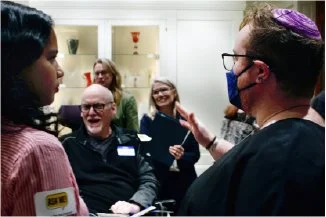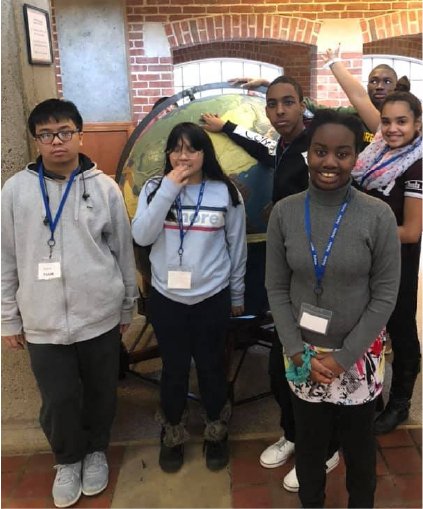Programs
We’re a resource for disability programs in Massachusetts.
See programs below from DPC, our partners, and other organizations working to improve the lives of those with disabilities.
MyOmbudsman
My Ombudsman is an independent program operated by DPC through a contract with MassHealth.
My Ombudsman helps people with and without disabilities get the care they need from their MassHealth health plans. We ensure that individuals can exercise their rights and access the benefits they have as a MassHealth member.
Any MassHealth health plan member can reach out to My Ombudsman when they need guidance accessing their benefits or navigating the healthcare system. We provide these services in English, Spanish, Portuguese, Mandarin, Cantonese, and American Sign Language, all by native speakers, and most of the staff who work with members both have disabilities themselves and are current or former enrollees in MassHealth's programs.
Disability DEI: Training & Consulting
Over years of working in disability advocacy, research, and direct services, we have noticed that disability is often missing from DEI conversations. Furthermore, when disability is discussed, often, the discussion is centered around the bare minimum for avoiding legal liability under the Americans with Disabilities Act. We believe that disabled people deserve better. We are a community with a shared history and experiences across disability and recognizing that is an essential part of creating a welcoming inclusive environment.
This DPC initiative provides disability focused DEI training, workplace inclusion consulting, and Technical Assistance to help organizations include disabled perspectives and promote disability inclusion. DPC has an extensive history of working with a multitude of organizations to bring a disability perspective and our unique knowledge to trainings, projects, papers, webinars, research, boards, and various other initiatives.
What Makes DPC’s Programs Unique
Disability Policy Consortium (DPC) is one of the only organizations in the United States that is led by people with disabilities and has successfully fought for a seat at the table on key issues, including healthcare, housing, employment, and education.
Our work promotes systemic change that addresses the significant health, social, and economic disparities that account for people with disabilities' limited participation in society. We're dedicated to advocating for the rights, civic participation, and social inclusion of people with disabilities through patient advocacy, grassroots organizing, research, education, and policy analysis. Our model prioritizes community-led systems change to maximize inclusion, innovation, and impact.
DPC is proud of our unique status as an organization that is truly of, by, and for the community that it engages and serves: a grassroots civil rights consortium that is run almost entirely by people with disabilities.
In redefining the role of government as it affects the lives of people with disabilities, we focus on combating inaccessibility, discrimination, and violence that stems from the systemic oppression and marginalization of people with disabilities. Because injustice is intersectional, and because people with disabilities who are members of other minority groups are marginalized in multiple ways, we strategically partner with organizations fighting racism, homophobia, cissexism, misogyny, and classism to pursue broader anti-racism and social justice goals.
We also work on changing the physical spaces, practices, and cultures of Massachusetts-based businesses to make them more accessible and inclusive for disabled employees and customers.
Through our diverse, transformative, and community-led work, we serve senior citizens, caregivers, people with intellectual, developmental, and psychiatric challenges, and public schoolchildren and their families. These groups represent key constituencies who directly benefit from our advocacy, research, and education initiatives aimed at improving healthcare, housing, education, and economic justice.
Diversity across all axes of society is critically important to us. We’ve prioritized diversity in both our board recruitment and employee hiring.
All of DPC’s 15 Board members and over 75% of our team of 26 are people with disabilities, including every member of our senior leadership team. Half of DPC’s employees identify as LGBTQ+. A majority of DPC’s Board members are low-income (including one who currently lives in a nursing home), and many of DPC’s staff are current or former Medicaid enrollees. DPC’s largest program specifically serves Medicaid members, and the organization has intentionally recruited program staff with relevant lived experience.
One-third of DPC’s Board Directors and team members (including two-thirds of its senior leadership) identify as people of color (POC). Increasing POC—and especially Black and Indigenous POC (BIPOC)—representation across the organization is a major recruiting goal, and the Board added four BIPOC members in as many years.
More broadly, the organization has emphasized anti-racism in its internal and external work, including undergoing a racial equity audit and establishing an anti-racism working group that develops new organizational policies and conducts regular staff trainings.
Research
DPC’s Research Team brings the voices of patients and people with disabilities into healthcare policymaking.
Specifically, this team conducts major health policy-relevant research to support DPC’s overall work. The team leverages a Community-Based Participatory Action Research (CBPAR) model to engage disability communities around high-impact issues.
DPC’s research partners include the Institute for Community Inclusion (ICI), Academy Health, Mathematica, the Rippel Foundation, and Community Catalyst. DPC is Brandeis University Lurie Institute for Disability Policy’s primary community partner, as DPC staff regularly collaborate with Brandeis faculty and students on various research projects.
A Brief History of Our Research
Over the past decade, DPC’s research has evaluated the impact of the opioid crisis and opiate policies on people with complex disabilities. Other DPC research projects have involved advancing knowledge about person-centered and patient-centered planning and convening stakeholders around developing less discriminatory healthcare value assessment frameworks. DPC staff have also analyzed the social determinants of health impacts on Medicaid enrollees in Minnesota and people with disabilities in Western Massachusetts. The team has engaged and centered the voice of MassHealth members in making decisions about statewide programmatic improvements.
Recent Research Efforts
In collaborating with Brandeis University, DPC has most recently researched the roles of Long-Term Supports Coordinators (LTS Coordinators) and Certified Peer Specialists (CPSs) in One Care. (One Care is a program from MassHealth that coordinates care for people enrolled in both Medicare and Medicaid.) DPC and Brandeis staff worked with Lived Experience Experts (LE Experts)-people with lived experience of disability, mental health, or substance use disorders, to conduct Zoom interviews. These LE Experts also assisted DPC staff in qualitatively examining interview data. The findings gathered from interviews with LTSCs, One Care members receiving LTSCs’ services, and health plan staff members, were published by Brandeis in a report called Strengthening the Long-Term Support Services Coordinator Role within One Care: A Qualitative Study and Analysis of the One Care Massachusetts Health Plan. An article on these results was submitted for publication in an academic journal. Findings gathered from the interviews with CPSs, One Care members receiving CPSs’ services, and health plan staff members were published by Brandeis in a report called The Role of Certified Peer Specialists in Capitated Managed Care Plans. An article on these results was also submitted for publication in an academic journal.
The Research Team is continuing its collaboration with Brandeis in studying the work of Care Coordinators within One Care. Preparations are being made to interview One Care members and health plan staff members about their experiences working with Care Coordinators. Care Coordinators will also be interviewed regarding their experience coordinating care in One Care. The team will also be analyzing survey results and making recommendations to administrators in Lynn, MA to help increase access to services for Lynn residents with disabilities. DPC continues to work with ICI in conducting research on a a progressive employment model initiative with people with disabilities to the benefit of disabled jobseekers and businesses alike.
Research News & Updates
Catch up on the latest research—including opportunities to participate in research studies.
Donate to DPC today.
Your donation will support grassroots organizing and community-based research that makes our state a more accessible and inclusive place.
Learn about donations to DPC.







